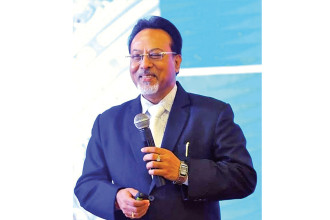
Mohan Ojha is the Managing Director of Growth Sellers. He is also the Managing Director of Growth Leadership Academy and Corporate Club, besides being associated with organisations like Human Resource Society Nepal as Vice President, Management Association of Nepal (MAN) as Secretary General and Rotary Club of Kathmandu Metro as member. Recently, he took over the role of the President of Federation of Outsourcing and Staffing Institution Nepal (FOSIN). While working in the corporate world for 17 years, he was introduced to many difficulties. This brought about the Growth Sellers — a complete HR solutions venture. Determined to professionalise human resources and create an active understanding in employer – employee relationships, in this edition of B360, he shares his thoughts on the Labour Act endorsed in August, an overview of the HR industry and the problems affecting this industry.
What are some of the key issues affecting human resource development in Nepal?
HR being a comparatively new genre in the context of Nepal, there is a lack of awareness about the importance of HR in many organisations. They believe and witness HR as a cost-centric department. Conducting trainings for employees, HR manuals, by-laws, and other amenities to staff is regarded as a cost rather than investment. In our country, HR is a showcase role as they don’t have the authority and power to take decisions. In fact, in most organisations, they are not involved in the decision making process. Overall, lack of priority, focus and proper government policies are key issues affecting HR development.
How can institutions and businesses in the country flourish when HR laws are so volatile?
While looking back at our three decade long history, the country faced many ups and downs in terms of the political scenario. We went through the Maoist insurgency, established constitutional assembly and dissolved it. The political instability impacted every sector. There was no development in the industrial sector, no attention to skilled manpower, no upgrade of industry, and we survived on remittance driven economy. The priority of the government was to introduce a stable government. HR laws were not put into practice. Now, the country has embraced federalism. People are positive that the changing political scenario will drive the country into development activities. With the introduction of the new Constitution and completion of elections, we believe there will be law and order in the country. In terms of HR laws, the government has already endorsed Labour Act and now the regulation is in process for public feedback. I see this as positive step towards HR development in the country. We are hopeful to have the regulations with required amendments as there are many provisions which have to be revised. If everything goes smooth, there is no doubt that the country will grow economically.
Do you believe in minimum wage? Why or why not?
The demarcation of minimum wage is necessary for a country like ours. But if you ask me personally, I don’t believe in minimum wage. I believe in determining payment scale in terms of acquired skills, performance, target and delivery. For performers, scale should always open.
What are the implications of the restriction on hire and fire provision for companies and employees?
The restriction on hire and fire provision is what the private sector is waiting for. This provision will bind both the employer and employee to be ethical and productive. With this legal provision, employees will be under constant pressure to work harder and with dedication, while companies cannot entertain nepotism and favoritism at the workplace. Retention and appraisal will be based on performance and employees will be more disciplined. Companies have space to fire unproductive staff.
How strong are labour unions today? Have they evolved from the time of the Maoist insurgency?
Unions were, are and will continue to be strong. However, that power should be used for their rights. Political parties should have monitoring mechanism for unnecessary demands, and unions should raise their voice only against unfair practices in organisations. Looking back at the Maoist insurgency, unions were highly influenced by politics. They started to advocate other issues rather than focus on welfare of employee rights. Unions now understand the actual objectives of establishing such unions. They now know how they should place their demand with employers and it has become more systematic and formalised than before.
 Workers who hold protests by keeping within the legal framework will be paid half a day’s wage even though no work is done. Your thoughts?
Workers who hold protests by keeping within the legal framework will be paid half a day’s wage even though no work is done. Your thoughts?
Previously, protestors were paid full even though an industry was closed for not fulfilling demands. It is a praiseworthy step from the government to introduce this provision of paying a half day’s wage for protesting within the legal framework. This has channelised and formalized the way for collective bargaining. Now both employers and employees have equal contribution to the protest and its consequences. Your opinion on the practicality of social protection measures such as gratuity, accident benefit, sickness benefit and provident fund, among others. Workers from the informal sector including domestic workers, trainees and part-time workers are entitled to receive these benefits. The introduction of social protection measures being compulsory for all workers is praiseworthy. However, I am more concerned about the practicality of addressing the issue of gratuity. It is mentioned that from the joining date, the employee will be liable for gratuity. I feel the government has addressed this issue without proper homework about its practicality. I am skeptical if employees take this facility as granted and use otherwise. If so, the turnover of employees will be high and companies will suffer financially.
After the act goes into effect, an employer will not be allowed to fire workers without a valid reason and without fulfilling lawful obligations. What are the implications?
I see this provision as a very positive sign to formalise the whole industry. Earlier, employers could be biased and fire any employee they didn’t like. But with this provision, employers have to have valid reasons to fire any worker. The right of the employee is secured and the industry becomes more formalised and systematic in the process of firing workers. The organisation also benefits with this provision as it won’t be liable for under-performing workers and there will be space for new talent.
How will businesses be affected by labour policies in the short and long term? What are the repercussions for small and medium businesses especially? Are we protecting to hurt businesses?
Introduction of Labour Act is a good step by the government to formalise businesses. The labour regulation is under the process of taking recommendations from concerned bodies for revision. The act is introduced with series of meetings among the government, trade unions and private sectors. However, for introducing regulations, the government has not discussed with any stakeholders. The first draft of the regulations hit the outsourcing companies. It seems like the regulation was introduced to prevent SME’s from the outsourcing business. The regulation may help a few limited business tycoons. This provision meanwhile will put financial burden on SME’s while in the long run, it will create unemployment. Roughly, there are 35,000 people getting employment via outsourcing in mobile companies alone. If the government suddenly introduces regulations that the outsourcing companies cannot sustain, these small companies will not be in the position to provide all outsourced staff permanent jobs, Its impact must be analysed.
Will policies such as these not further impact skilled human resources drain from the country?
Provisions like the hire and fire rule, social securities act and other provisions will definitely make positive impact on the industry. Employees will have add-on facilities working here unlike earlier. There will be more professionalism in the industry. I believe this will make the workplace environment better and help in retaining human resources in the country.






